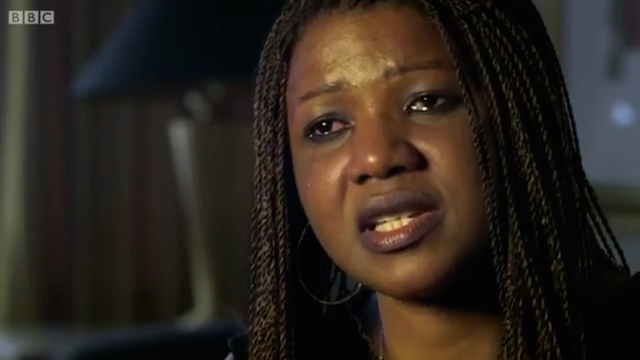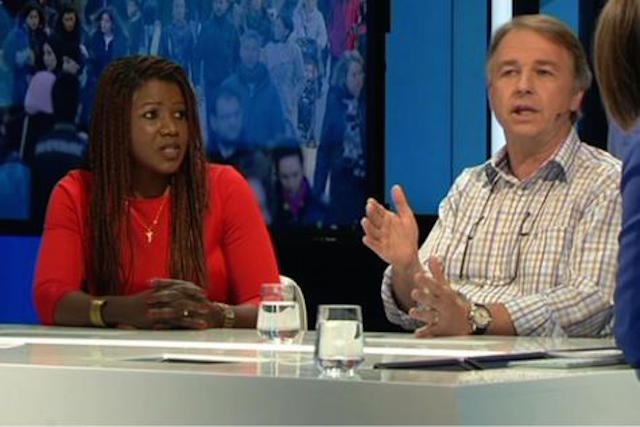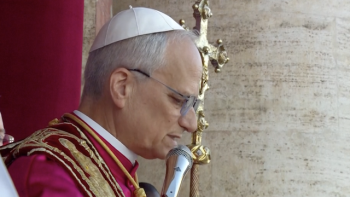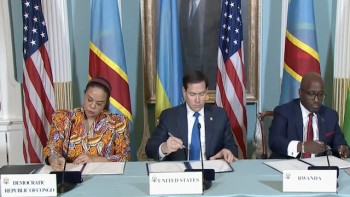Marie Bamutese, AfroAmerica Network Black Woman of Year 2014, is a survivor. As a schoolgirl, Marie Bamutese survived two of the worst tragedies the World has even known:
the 1990-1994 Rwandan civil war during which millions of civilians were systematically massacred by warring parties, while the indifferent international community was watching and the systematic massacre of 6 million Rwandan Hutu refugees and Congolese civilians by Rwandan Patriotic Front.
She, along with millions of Hutu refugees fleeing the systematic massacres by the army of the Rwandan Patriotic Front, saw hundreeds of thousands of refugees, including her own relatives, killed, either by the army, or diseases, or hunger. She subsequently joined other surviving refugees into camps in Zaire, now the Democratic Republic of the Congo.
Two years, later, refugee camps she has fled to were attacked and destroyed by the army of the Rwandan Patriotic Front. More that 6 millions people, including Rwandan Hutu refugees and Congolese civilians were systematically massacred by the Rwandan Patriotic Army (RPA). She, like tens of thousand of young girls and women, was raped. Fortunately, she was able to be rescued, and flown to Europe.
She has survived to tell the story.
In 2014, she finally told her story in a BBC Documentary "This World: Rwanda's Untold Story", aired on October 1, 2014 and that can be seen here.
BBC summarizes Marie Bamutese's story as follows:
 "But it was our last interviewee in that really stuck with me. She had never spoken publicly at length about her experiences. Marie Bamutese was one of hundreds of thousands of Hutu refugees brutalized and chased across Rwanda and into the Congo by forces allied to Paul Kagame. I had contacted her husband, Peter Verlinden about access to television archive material. In passing he mentioned that Marie had briefly appeared on Flemish television describing her ordeal, which Peter had described in his book on the war. I asked if she would be prepared to do a full interview about her experiences. Such were the horrors she had experienced that Marie was afraid of recounting them publicly particularly in a foreign third language, English. She was fearful that she would not be able to accurately communicate exactly what happened to her but wanted to go ahead with the interview.
"But it was our last interviewee in that really stuck with me. She had never spoken publicly at length about her experiences. Marie Bamutese was one of hundreds of thousands of Hutu refugees brutalized and chased across Rwanda and into the Congo by forces allied to Paul Kagame. I had contacted her husband, Peter Verlinden about access to television archive material. In passing he mentioned that Marie had briefly appeared on Flemish television describing her ordeal, which Peter had described in his book on the war. I asked if she would be prepared to do a full interview about her experiences. Such were the horrors she had experienced that Marie was afraid of recounting them publicly particularly in a foreign third language, English. She was fearful that she would not be able to accurately communicate exactly what happened to her but wanted to go ahead with the interview.
We met at our hotel. Marie sent Peter away; she wanted to tell this story alone. The story was so awful and extreme that she had only recently told Peter the full detail of what she was about to tell us, years after being smuggled out of the Congo. He did not hear it again and she did not need him to witness her telling it. We decided with Marie that she should speak in French; she would be able to more freely express herself and be certain that she said what she meant. The interview was one awful account of death and torture after another. Marie was just a young girl when she witnessed the repeated bombing of Hutu refugee camps by Kagame’s artillery and the remains of Hutu refugees piled upon one another forming a hillside. She saw her own grandmother die of physical and moral exhaustion in front of her and her mother cry inconsolably. Marie could not hold her own tears back when she told us how her own seven year old cousin, Elodie, died on her back as she carried her though the forests to escape the massacres. She described how death had become a friend, the only constant and certain thing around her in the hell of the Congolese forests. She broke down again when she remembered how her own mother was forced to do a deal with a local family; her daughter Marie would be raped in exchange for the family’s safety. By the end of the interview Marie’s tears had been replaced by anger and by what seemed to be cathartic relief. She was anxious to ensure that people knew that massacres were committed by all sides - including Kagame’s Rwandan Patriotic Front, who until today have been viewed largely as the heroes of 1994. The family members Marie lost in the Congo were amongst the estimated 5 million people who died in the African wars which followed the Rwandan genocide of 1994."
©2014 AfroAmerica Network.

















